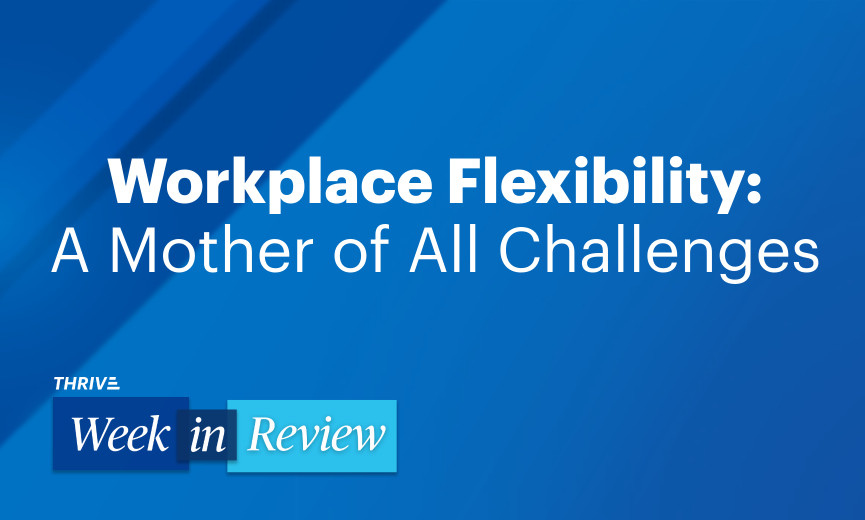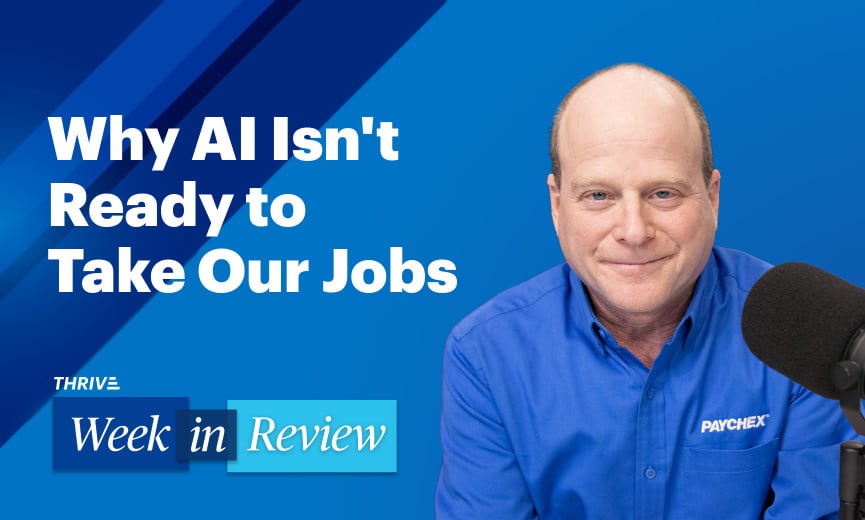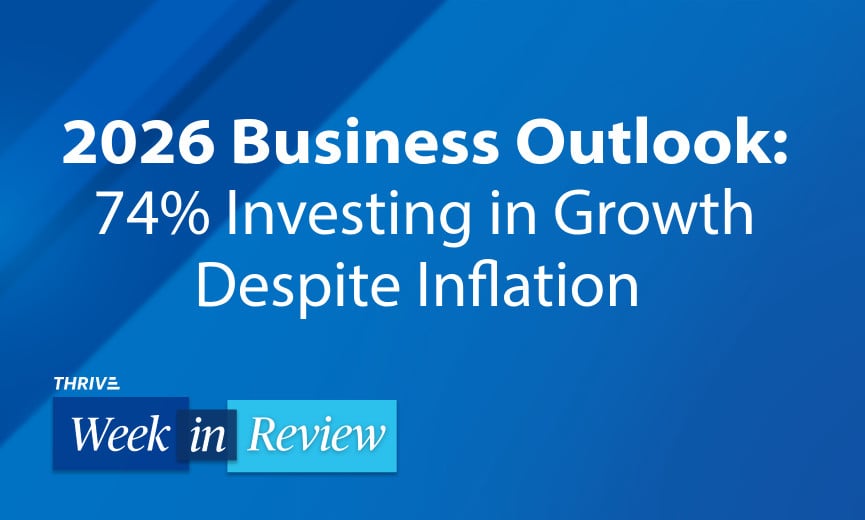- Thrive
-
Temporada
4Episodio59
Fuentes de financiación, un ajuste para SECURE 2.0 y por qué la generación Z no tendrá éxito con el trabajo remoto

Podcast •

Resumen
There’s funding and money available, whether that’s through state or federal sources or SECURE 2.0, which has credits available to help establish a workplace retirement plan. Gene Marks says businesses should take advantage, especially when state and federal governments are offering the funds. And, in one NYU professor’s eyes, Gen Z is missing out of creating a concrete financial future by working remotely and staying away from the office. Host Gene Marks says that’s one opinion. Listen to this week’s episode to hear other points of view.
Ver transcripción
Gene Marks, host
Hey everybody, this Gene Marks and welcome to another edition of the Paychex THRIVE Week in Review podcast where we pick out a few bits of news from the past week and how they impact your business. So, let's get right to it.
We're going to talk about funding first. The state of Maine and Gov. Mills of the state of Maine announced this past week that they are opening a second phase of what they call Thrive Maine, which is a forgivable loan program of up to $2 million to small businesses that were impacted negatively by the pandemic.
So, those qualifying businesses have to show they've experienced increased costs and market interruptions or losses due to COVID-19. If you're a business in the state of Maine, you should definitely be checking out that funding.
You know, when I was about small business funding, there is you know, there's a lot of options that are out there. And sure enough, just this past week, the U.S. Chamber of Commerce also published a really great article called “48 Grants, Loans, and Programs to Benefit Your Small Business.” This is up to date and current. It was just released. So, it's news and I think you should be checking it out.
Now, rather than giving you the long website address, just Google “U.S. Chamber and 48 grants” and you're going to find it. It's called “48 Grants, Loans, and Programs to Benefit Your Small Business.”
So, what kind of grants and loans and programs are we talking about? Well, first of all, the U.S. Chamber talks about government grants that are available. For example, the National Institute of Health has grant opportunities related to COVID-19 research they reserve for small businesses that develop and research biomedical technology. There are multiple grants that are available with deadlines throughout the year. So, it's definitely something you could be looking into.
There's also the Small Business Innovative Research Program. These are grants for small businesses, so they can participate in federal research and development with the potential for commercialization. And, also, the U.S. Department of Commerce, for example, has grants for minority businesses. It's their minority business development agency. These are targeted grants and loans that are for minority-owned businesses. They're offered throughout the year. That's the U.S. government side there.
There's other stuff, as well. I mean, general, small businesses, the U.S. Chamber itself has a grant program called America's Top Small Business Grant Program, where they offer up to $25,000 in cash. Barstool Sports, if you're a fan of them, they have something called the Barstool Fund. These are for small businesses that were impacted by COVID-19 and winners are chosen on a on a rolling basis. There's also a grant that's available called the Fresh Start Business Grant. So, it's made by a company called Ink File that helps form businesses; it's up to a 20 $500 grant with deadlines in March, June and September of this year.
There are industry specific and diversity, small business grants and programs available as well. There's just a bunch of stuff in this article. It's really good. What I like about it is, you know, the most is that it is up to date. And again, it was just published just this past week. So, it's definitely something that you should be checking out again. Google “U.S. Chamber and 48 grants” and you will find a whole bunch of really great funding opportunities for your business.
So, funding is in the news this week.
Also in the news is SECURE 2.0. Now, SECURE 2.0 was legislation that was passed at the very end of 2022 and it impacted retirement savings. Just this past week, there was a bipartisan Congressional group who wrote a letter to Secretary Treasurer Yellen and the IRS outlining different tactical errors, things, you know, little tweaks and adjustments that they want to make to the law.
I'm not going to dive into those because they're very, very technical and detailed. What I want to make sure that I take a moment to just remind you, because of this letter that was just sent this past week, is to take advantage of SECURE 2.0. It's still it's relatively new. Make sure if you are starting a new 401(k) plan for your business, you can get tax credits now thanks to the SECURE 2.0 to reimburse you for the costs of starting that plan.
If you have less than 50 employees and you can contribute up to $1,000 as a match to your employees contribution to their 401(k) plan, you might also be eligible for tax credits under SECURE 2.0. If you have employees that are making student loan payments, you may also be able to match those student loan payments into their 401(k) retirement plan.
If you have a Roth 401(k) — that's an after tax savings plan — or you want to set one up, it's now easier to do this, there's expanded use, and you now have the ability to make employer matches to a Roth 401(k). That wasn't the case before. And finally, you know, by the way, there's a lot of other provisions, but now employees can take out to $1,000 a year for emergencies from their 401(k)s without being penalized on them. And that's a big deal because a lot of times people weren't able to get access to that money, and sometimes you and me as employers, we would have to step up to help our employees. Well, now, if they're putting money away, that's the first use that they can use that money before they come to us for help.
So, I just want to make you aware of that. SECURE 2.0 — again, it was passed in December — just this past week there's been, you know, a letter written to the Treasury Secretary, you know, proposing some adjustments to SECURE 2.0. That's fine. But let's just remember that there are all these provisions that are affecting now and also going to be affecting in the future in the next few years that will really impact your business, really enable you to provide more retirement savings for both yourself and your employees to enhance your retirement plans with the government's help, so you you're be more competitive as well with bigger companies to attract and retain employees because you're offering better retirement benefits.
So again, SECURE 2.0. Talk about it with your accountant or your HR specialist. Talk about it if you're a Paychex customer. Talk to them about it. There is a lot of opportunities there for businesses to take advantage.
The final piece of news we have this week has to do with working from home and Generation Z. Scott Galloway, who is a New York University professor and also a guest on the THRIVE, soon will be released. Scott Galloway, who is very opinionated on many things about the economy, he's really an awesome guy to talk to and very, very knowledgeable. On his podcast, he says that your resistance to a return to the office could be a major, you know, majorly holding workers back from benefiting themselves.
Galloway, again, this guy is an experienced marketing professor worldwide, he says you should never be at home. He said this to a Wall Street Journal CEO council summit last week. He said, “That's what I tell young people. Home is for seven hours of sleep and that's it. The amount of time you spend in the home is inversely correlated to your success professionally and romantically. You need to be out of the house.”
Galloway — and by the way, this comes from a Fortune.com article — he's also a founder of a number of companies, including brand consultancy, profit and e-commerce firm Red Envelope. He insists that work life balance is a myth. He adds that success requires an effort level of 110%. “I don't remember my twenties and thirties other than work,” he says. “It cost me my hair. It cost me my first marriage, and it was worth it. If you expect to be in the top 10 percent economically, much less the top 1%, buck up. Two decades-plus of nothing but work, that's my experience.”
Do you agree with that? Well, the work-from-home debate, the flexibility, the work/life balance debate, that's going to certainly continue. You know, Professor Galloway has got his points of view. I know a lot of people have opposing points of view to that.
But let's all agree, particularly for Gen Z workers, there is value in having your workers come into the office. It is important to get your workers working with people so that they can get mentoring from them. So, just consider that. Maybe you don't have to be as extreme as Professor Galloway's point of view, but I think it is important to get your Gen Z workers into the office.
You've been listening to the Paychex THRIVE Week in Review Podcast. My name is Gene Marks. If you need any help or advice or tips, or if you'd like to suggest a guest for a THRIVE podcast, please visit us at payx.me/thrivetopics.
Thanks for listening. I will see you again next week. Take care.
Este pódcast es propiedad de Paychex, Inc. 2023. Todos los derechos reservados.

 Apple Podcast
Apple Podcast Spotify
Spotify iHeartRadio
iHeartRadio








